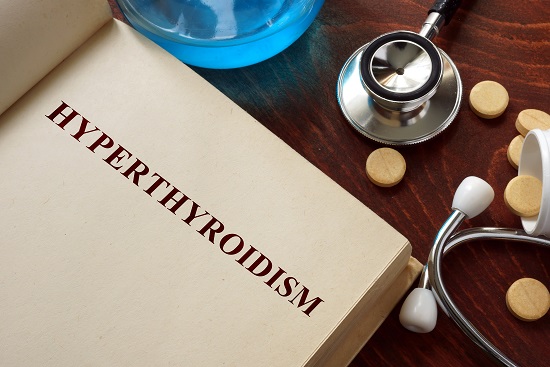
Hyperthyroidism, also known as an overactive thyroid, occurs when the thyroid gland produces too much thyroid hormone. These hormones affect nearly every organ in your body and control many of your body's most important functions.
The thyroid gland is a small, butterfly-shaped gland located in the front of the neck, just in front of the trachea. The thyroid gland produces hormones that regulate the way the body utilises energy. Therefore, these hormones affect most organs in your body, including your heartbeat. With an excess of thyroid hormone, several bodily functions are accelerated.
An overactive thyroid may affect anyone, although it is approximately 10 times more prevalent in women than in men and often affects those between the ages of 20 and 40.
Hyperthyroidism can cause various symptoms and may vary from person to person. The onset of symptoms might be gradual or sudden. While for some, the symptoms may be mild, for others, they may be severe and significantly affect their life.
The following are the common signs and symptoms of hyperthyroidism:
Hyperthyroidism is a condition in which the thyroid gland produces an excessive amount of thyroid hormones. This results in elevated levels of the two primary thyroid hormones, triiodothyronine (T3) and thyroxine (T4).
Graves' disease is the leading cause and the most common cause of
hyperthyroidism. It is an autoimmune
disorder in
which antibodies produced by your immune system stimulate the thyroid to become overactive.
Graves'
disease has no known cause. However, it primarily affects young or middle-aged women who are genetically inclined.
Additionally, smoking might raise your risk of developing it.
This condition occurs when one or more nodules on the thyroid gland are overactive.
Nodules are usually
noncancerous
(benign), although they may contain thyroid tissue, which can lead to excess production of thyroid hormones.
It is unclear why some develop thyroid nodules. However, those over 60 years old are typically affected.
It is the inflammation of the thyroid gland, causing excess thyroid hormone to be produced.
Increased iodine levels in the body can cause the thyroid to produce excessive amounts of thyroid hormones. It may take several months for your thyroid hormone levels to return to normal after discontinuing a medicine that causes an overactive thyroid.
Hyperthyroidism is usually treatable. The goal of treatment is to decrease thyroid hormone levels and manage the symptoms. The three main treatments are medicine, radioactive iodine treatment, and surgery:
Anti-thyroid drugs reduce the symptoms of hyperthyroidism by preventing the thyroid gland from producing excess amounts of thyroid hormone.
Some of the drugs given include propylthiouracil and carbimazole. Treatment with anti-thyroid drugs usually continues for at least a year or longer.
Beta blockers can relieve symptoms such as tremors, fast heartbeat, and palpitations by reducing heart rate, although this medication does not affect thyroid levels.
Radioactive iodine therapy is a highly effective treatment for hyperthyroidism, designed to destroy overactive thyroid cells and reduce thyroid hormone production. In this treatment, patients receive a liquid or capsule containing a low dose of radioactive iodine, which is absorbed by the thyroid gland.
Most patients require only a single dose of radioactive iodine, and it may take several weeks to months to experience the full benefits. The treatment involves a low dose of radiation, ensuring effective management of hyperthyroidism while minimising risks.
The removal of the thyroid gland (thyroidectomy)is done to prevent a recurrence, if the thyroid gland is severely swollen or if other modes of treatment are unavailable. To compensate for the absence of a thyroid gland, you would require medication lifelong.
If left untreated, hyperthyroidism can lead to several complications, including:
Around 1 in 4 people with hyperthyroidism, particularly from Graves' disease, develop thyroid eye disease, which can cause dry eyes, sensitivity to light, blurred vision, and even bulging eyes. Severe cases may lead to vision loss, requiring treatments like eye drops, steroids, or surgery.
Radioactive iodine treatment may cause hypothyroidism (underactive thyroid), leading to symptoms like tiredness, weight gain, and sensitivity to cold. This condition may be temporary or permanent, often requiring lifelong treatment with thyroid hormones.
Both carbimazole and radioactive iodine can harm an unborn baby. Women should avoid pregnancy during treatment and consult their doctor if they plan to conceive. Untreated hyperthyroidism during pregnancy can increase risks like pre-eclampsia, miscarriage, and premature birth.
A rare but life-threatening complication, thyroid storm can occur with undiagnosed or poorly controlled hyperthyroidism. Symptoms include rapid heartbeat, high fever, and severe agitation. Immediate medical attention is required.
Hyperthyroidism can also increase the risk of atrial fibrillation, osteoporosis, and heart failure.
Proper management of hyperthyroidism is crucial to prevent these serious complications.
Early detection of hyperthyroidism is crucial for effective treatment. Our caring and multidisciplinary team of healthcare professionals is available for consultation and to provide the best care.
Get in touch with us to book an appointment with an Endocrinologist at Gleneagles Hospital Penang today. We assure you of the best possible care tailored to your specific needs.

Wait a minute

Wait a minute